- Home
- Sylvia Plath
The Colossus Page 4
The Colossus Read online
Page 4
Exact as a snowflake.
But here—a burgeoning
Unruly enough to pitch her five queenly wits
Into vulgar motley—
A treason not to be borne. Let idiots
Reel giddy in bedlam spring:
She withdrew neatly.
And round her house she set
Such a barricade of barb and check
Against mutinous weather
As no mere insurgent man could hope to break
With curse, fist, threat
Or love, either.
Frog Autumn
Summer grows old, cold-blooded mother.
The insects are scant, skinny.
In these palustral homes we only
Croak and wither.
Mornings dissipate in somnolence.
The sun brightens tardily
Among the pithless reeds. Flies fail us.
The fen sickens.
Frost drops even the spider. Clearly
The genius of plenitude
Houses himself elsewhere. Our folk thin
Lamentably.
Mussel Hunter at Rock Harbor
I came before the water-
Colorists came to get the
Good of the Cape light that scours
Sand grit to sided crystal
And buffs and sleeks the blunt hulls
Of the three fishing smacks beached
On the bank of the river’s
Backtracking tail. I’d come for
Free fish-bait: the blue mussels
Clumped like bulbs at the grass-root
Margin of the tidal pools.
Dawn tide stood dead low. I smelt
Mud stench, shell guts, gulls’ leavings;
Heard a queer crusty scrabble
Cease, and I neared the silenced
Edge of a cratered pool-bed.
The mussels hung dull blue and
Conspicuous, yet it seemed
A sly world’s hinges had swung
Shut against me. All held still.
Though I counted scant seconds,
Enough ages lapsed to win
Confidence of safe-conduct
In the wary otherworld
Eyeing me. Grass put forth claws;
Small mud knobs, nudged from under,
Displaced their domes as tiny
Knights might doff their casques. The crabs
Inched from their pygmy burrows
And from the trench-dug mud, all
Camouflaged in mottled mail
Of browns and greens. Each wore one
Claw swollen to a shield large
As itself—no fiddler’s arm
Grown Gargantuan by trade,
But grown grimly, and grimly
Borne, for a use beyond my
Guessing of it. Sibilant
Mass-motived hordes, they sidled
Out in a converging stream
Toward the pool-mouth, perhaps to
Meet the thin and sluggish thread
Of sea retracing its tide-
Way up the river-basin.
Or to avoid me. They moved
Obliquely with a dry-wet
Sound, with a glittery wisp
And trickle. Could they feel mud
Pleasurable under claws
As I could between bare toes?
That question ended it—I
Stood shut out, for once, for all,
Puzzling the passage of their
Absolutely alien
Order as I might puzzle
At the clear tail of Halley’s
Comet coolly giving my
Orbit the go-by, made known
By a family name it
Knew nothing of. So the crabs
Went about their business, which
Wasn’t fiddling, and I filled
A big handkerchief with blue
Mussels. From what the crabs saw,
If they could see, I was one
Two-legged mussel-picker.
High on the airy thatching
Of the dense grasses I found
The husk of a fiddler-crab,
Intact, strangely strayed above
His world of mud—green color
And innards bleached and blown off
Somewhere by much sun and wind;
There was no telling if he’d
Died recluse or suicide
Or headstrong Columbus crab.
The crab-face, etched and set there,
Grimaced as skulls grimace: it
Had an Oriental look,
A samurai death mask done
On a tiger tooth, less for
Art’s sake than God’s. Far from sea—
Where red-freckled crab-backs, claws
And whole crabs, dead, their soggy
Bellies pallid and upturned,
Perform their shambling waltzes
On the waves’ dissolving turn
And return, losing themselves
Bit by bit to their friendly
Element—this relic saved
Face, to face the bald-faced sun.
The Beekeeper’s Daughter
A garden of mouthings. Purple, scarlet-speckled, black
The great corollas dilate, peeling back their silks.
Their musk encroaches, circle after circle,
A well of scents almost too dense to breathe in.
Hieratical in your frock coat, maestro of the bees,
You move among the many-breasted hives,
My heart under your foot, sister of a stone.
Trumpet-throats open to the beaks of birds.
The Golden Rain Tree drips its powders down.
In these little boudoirs streaked with orange and red
The anthers nod their heads, potent as kings
To father dynasties. The air is rich.
Here is a queenship no mother can contest—
A fruit that’s death to taste: dark flesh, dark parings.
In burrows narrow as a finger, solitary bees
Keep house among the grasses. Kneeling down
I set my eye to a hole-mouth and meet an eye
Round, green, disconsolate as a tear.
Father, bridegroom, in this Easter egg
Under the coronal of sugar roses
The queen bee marries the winter of your year.
The Times Are Tidy
Unlucky the hero born
In this province of the stuck record
Where the most watchful cooks go jobless
And the mayor’s rôtisserie turns
Round of its own accord.
There’s no career in the venture
Of riding against the lizard,
Himself withered these latter-days
To leaf-size from lack of action:
History’s beaten the hazard.
The last crone got burnt up
More than eight decades back
With the love-hot herb, the talking cat,
But the children are better for it,
The cow milk’s cream an inch thick.
The Burnt-out Spa
An old beast ended in this place:
A monster of wood and rusty teeth.
Fire smelted his eyes to lumps
Of pale blue vitreous stuff, opaque
As resin drops oozed from pine bark.
The rafters and struts of his body wear
Their char of karakul still. I can’t tell
How long his carcass has foundered under
The rubbish of summers, the black-leaved falls.
Now little weeds insinuate
Soft suede tongues between his bones.
His armorplate, his toppled stones
Are an esplanade for crickets.
I pick and pry like a doctor or
Archæologist among
Iron entrails, enamel bowls,
The coils and pipes that made him run.
The small dell eats what ate it o
nce.
And yet the ichor of the spring
Proceeds clear as it ever did
From the broken throat, the marshy lip.
It flows off below the green and white
Balustrade of a sag-backed bridge.
Leaning over, I encounter one
Blue and improbable person
Framed in a basketwork of cattails.
O she is gracious and austere,
Seated beneath the toneless water!
It is not I, it is not I.
No animal spoils on her green door-step.
And we shall never enter there
Where the durable ones keep house.
The stream that hustles us
Neither nourishes nor heals.
Sculptor
FOR LEONARD BASKIN
To his house the bodiless
Come to barter endlessly
Vision, wisdom, for bodies
Palpable as his, and weighty.
Hands moving move priestlier
Than priest’s hands, invoke no vain
Images of light and air
But sure stations in bronze, wood, stone.
Obdurate, in dense-grained wood,
A bald angel blocks and shapes
The flimsy light; arms folded
Watches his cumbrous world eclipse
Inane worlds of wind and cloud.
Bronze dead dominate the floor,
Resistive, ruddy-bodied,
Dwarfing us. Our bodies flicker
Toward extinction in those eyes
Which, without him, were beggared
Of place, time, and their bodies.
Emulous spirits make discord,
Try entry, enter nightmares
Until his chisel bequeaths
Them life livelier than ours,
A solider repose than death’s.
Flute Notes from a Reedy Pond
Now coldness comes sifting down, layer after layer,
To our bower at the lily root.
Overhead the old umbrellas of summer
Wither like pithless hands. There is little shelter.
Hourly the eye of the sky enlarges its blank
Dominion. The stars are no nearer.
Already frog-mouth and fish-mouth drink
The liquor of indolence, and all things sink
Into a soft caul of forgetfulness.
The fugitive colors die.
Caddis worms drowse in their silk cases,
The lamp-headed nymphs are nodding to sleep like statues.
Puppets, loosed from the strings of the puppet-master,
Wear masks of horn to bed.
This is not death, it is something safer.
The wingy myths won’t tug at us any more:
The molts are tongueless that sang from above the water
Of golgotha at the tip of a reed,
And how a god flimsy as a baby’s finger
Shall unhusk himself and steer into the air.
The Stones
This is the city where men are mended.
I lie on a great anvil.
The flat blue sky-circle
Flew off like the hat of a doll
When I fell out of the light. I entered
The stomach of indifference, the wordless cupboard.
The mother of pestles diminished me.
I became a still pebble.
The stones of the belly were peaceable,
The head-stone quiet, jostled by nothing.
Only the mouth-hole piped out,
Importunate cricket
In a quarry of silences.
The people of the city heard it.
They hunted the stones, taciturn and separate,
The mouth-hole crying their locations.
Drunk as a fetus
I suck at the paps of darkness.
The food tubes embrace me. Sponges kiss my lichens away.
The jewelmaster drives his chisel to pry
Open one stone eye.
This is the after-hell: I see the light.
A wind unstoppers the chamber
Of the ear, old worrier.
Water mollifies the flint lip,
And daylight lays its sameness on the wall.
The grafters are cheerful,
Heating the pincers, hoisting the delicate hammers.
A current agitates the wires
Volt upon volt. Catgut stitches my fissures.
A workman walks by carrying a pink torso.
The storerooms are full of hearts.
This is the city of spare parts.
My swaddled legs and arms smell sweet as rubber.
Here they can doctor heads, or any limb.
On Fridays the little children come
To trade their hooks for hands.
Dead men leave eyes for others.
Love is the uniform of my bald nurse.
Love is the bone and sinew of my curse.
The vase, reconstructed, houses
The elusive rose.
Ten fingers shape a bowl for shadows.
My mendings itch. There is nothing to do.
I shall be good as new.

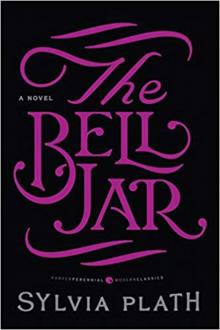 The Bell Jar
The Bell Jar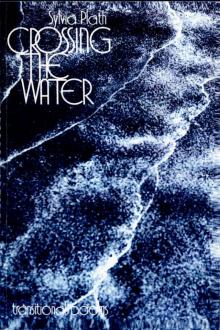 Crossing the Water
Crossing the Water Ariel
Ariel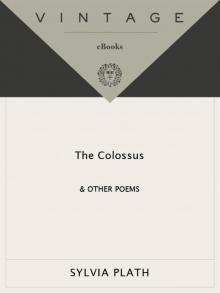 The Colossus
The Colossus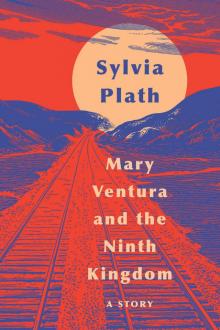 Mary Ventura and the Ninth Kingdom
Mary Ventura and the Ninth Kingdom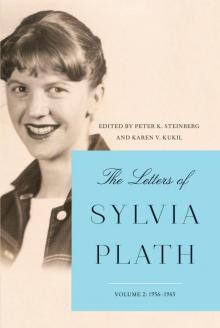 The Letters of Sylvia Plath Vol 2
The Letters of Sylvia Plath Vol 2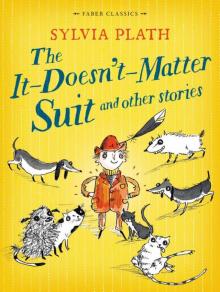 The It Doesn't Matter Suit and Other Stories
The It Doesn't Matter Suit and Other Stories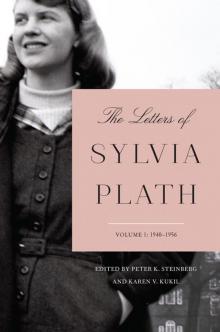 The Letters of Sylvia Plath Volume 1
The Letters of Sylvia Plath Volume 1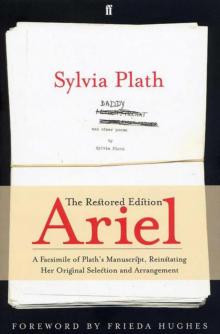 Ariel: The Restored Edition
Ariel: The Restored Edition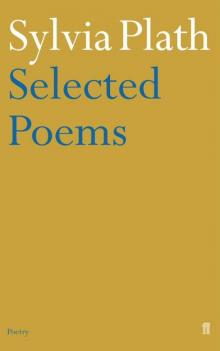 Selected Poems of Sylvia Plath
Selected Poems of Sylvia Plath